Covid in Scotland: Can in-person GP appointments ever fully return?
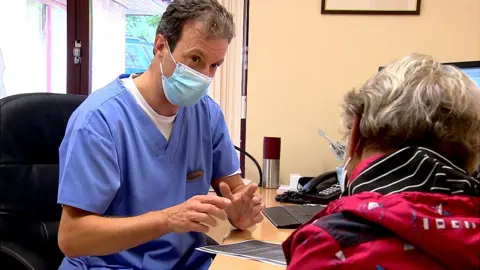 BBC
BBCCommunity doctors have told the BBC they cannot imagine returning to normal face-to-face service with current levels of demand.
Allowing more patients to see their GP in person is a top priority for the government's NHS Recovery Plan.
But as the country tries to emerge from the pandemic, surgeries are seeing unprecedented pressure to catch up with patients.
Penicuik Medical Practice in Midlothian invited the BBC in to see how close it was to returning to business-as-usual.
There we met Alex Barrett, 73, who has been waiting for a knee replacement for several months. He has had the other knee replaced previously but faces a wait. It's left to his primary care team to help manage the pain in the meantime, and today it's the job of the physiotherapist at the local practice.
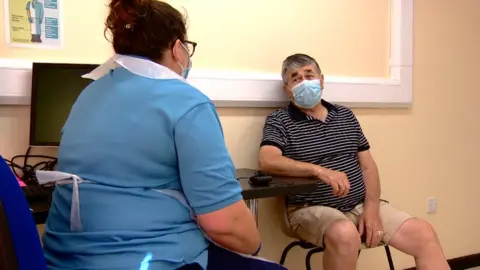
Alex says he understands why he has to wait. "You just wait and take your turn, they're busy, there's not much more you can do. You get a bit fed up taking the tablets. If you had your knee done, you'd stop."
The knock-on effects of the pandemic mean growing delays to hospital treatment. And where people can't access specialist doctors, they've been turning to their local surgeries in ever greater numbers.
'From 150 calls a day to 600'
With almost 12,000 patients on their books, the large admin team works to manage calls.
Practice manager James Reilly says there has been a sharp rise in demand.
"Taking it back to before the pandemic a busy, busy day was 150 calls. An average day now is 300-400 calls, so it's a massive spike every day. We do our best to answer as many as possible, unfortunately sometimes it even goes up to 600 and at that point, we just can't get to all those calls. We are as frustrated as patients when this does happen."
But he says it's a mistake to believe they're not seeing patients face-to-face.
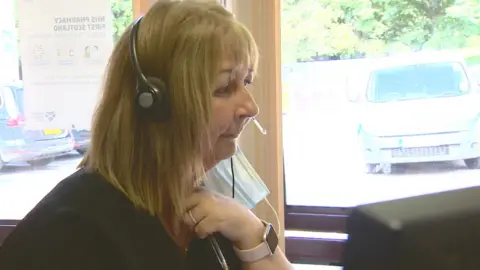
"Certainly in the last few weeks we've spoken to over 3,000 patients and 1,000 of them came into the practice, so we are definitely here, we are definitely open."
The team have taken some people off hospital waiting lists completely, by treating them in-house.
Dora Nicoll, 87, faced a wait of up to 20 months to see a dermatologist about a cancerous lesion on her leg. But staff at the practice were able to remove it instead.
She says she has not had problems getting an appointment.
"If I have a problem, I can ring up and say, can you help me out? Usually someone will call me back and that works well."
'Video appointments should always have been a thing'
The health secretary has confirmed that new guidance should allow practices to see more people in person. But greater use of telephone and video appointments, brought in when the pandemic hit, is going to continue.
Lewis Roxburgh has a virtual appointment with Dr Drummond Begg to discuss a stomach issue. He says it suits him to call in from work, rather than attend in person.
"Video appointments should always have been a thing. It's more convenient and it's easier to get a faster appointment," he said. "For me personally, I don't have to travel to the medical practice and I get everything I need."
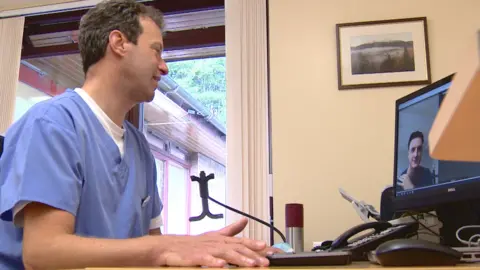
Dr Begg has been a GP for 25 years. He says they won't go back to business as usual, the way they worked before.
"In person consultations are really important, to examine people, to give injections, to remove lesions, all of these. I think a flexible approach is what we need. It's what we were planning to do before the pandemic anyway; a flexible mix of phone call, video and in-person consulting where it is appropriate."
Dr Begg says the new ways of working are essential to deal with the huge number of requests they get.
"There is a demand, capacity gap and indeed there was before the pandemic. We are seeing at last more students come through medical school and more people finally coming to join general practice training, but this is going to take at least ten years to turn things around.
"We should have really started recruiting for the demand and needs we have 10 years ago."
The first minister has reiterated a promise to increase funding for primary care by a quarter over the course of this parliament.
Ministers have also repeated a pledge first made in 2017, to recruit 800 new GPs by 2027. But so far they've only added 234 to the national headcount - and a growing proportion of those are working part-time.
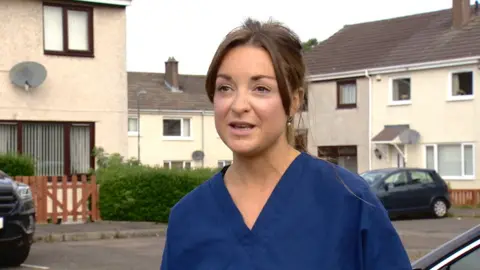
Dr Becky Harley qualified as a GP three years ago. She says it's a complex job.
"There is always the opinion of, 'I'll just do GP training, I'll just be a GP'. There is nothing about being a GP that is 'just' being a GP.
"It's a hard job but it's really rewarding so if we can get medical students into GP practices to see that and to see what a difference you can make, that would make a huge difference to recruitment I think."
For now, Dr Harley is just one part of a wider team working hard to care for a population which is getting older and sicker - with coronavirus still hanging over them.
They welcome long-term commitments to increase their resources - but worry it won't address the challenges they face in the next few weeks and months.


